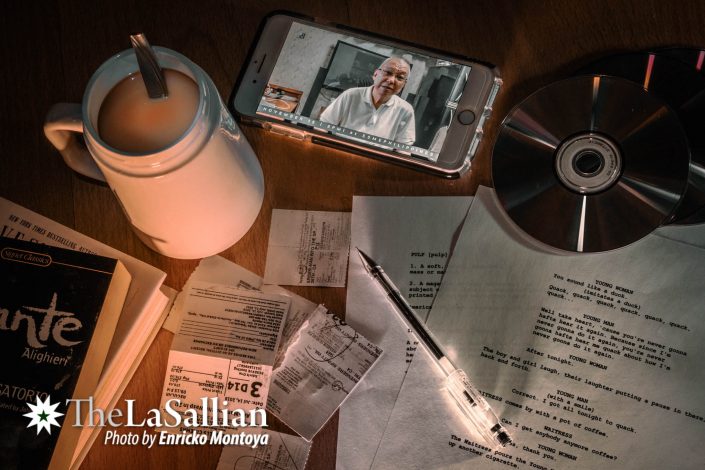
Inside all of us is the innate drive to create something meaningful—whether it’s an essay your professor will read or a business pitch for your boss or a film for your audience, we always have the end goal of wanting to understand and being understood. We aim to hold people’s attention; there must always be that little something that will make your audience want to hang on your every word. The question is: what is the secret?
Perhaps the best person to ask is someone who has defined the Filipino film industry with his showstopping storytelling. Ricky Lee has been lauded by generations of filmmakers, readers, and audiences. In his decades-long career, he has lived different lives through the 180 screenplays and 16 books he’s written; his screenplays for Himala, Anak, The Flor Contemplacion Story, and so many other classic films have cemented their place in the cinematic pantheon. He has been holding screenwriting workshops for many starry-eyed prospective writers hoping to finally find the secret to storytelling magic since 1982. However, with the pandemic necessitating physical distancing protocols, he started conducting online workshops in March.
Last November 15, Lee conducted a webinar in partnership with online platform Esme.ph titled Secrets to Storytelling with Ricky Lee. This exclusive masterclass dug deep into the internal dialogues each of us must have to breathe raw and authentic life into the stories we pen. Don’t be fooled by the fact that Lee’s workshops have produced master filmmakers and writers. Secrets to Storytelling is for every teacher, student, nurse, call center agent, painter, or dreamer whose story is just waiting to be told.
Go to your own bodega
Coming into this course, one would expect an in-depth discussion of jargon and formal rules and structures, but two minutes in, and anyone would know that Lee is not your garden-variety lecturer. He encourages everyone to turn on their cameras and unmute them every time they wish to let out a laugh. He entertained all questions as if you were old friends huddled in a coffee shop. Despite the relaxed atmosphere, the attendees have nothing but respect for the smiling man: when Ricky Lee speaks, a hush falls over the room and the audience waits with bated breath for what he has to say.
“Hanapin niyo ang wala sa inyo,” Lee highlights. For Lee, his dearly departed mother would always leave her mark in the characters he writes. You can see in Vilma Santos’ Josie in Anak and Bituin Escalante’s Aling Saling in Himala that this is how Lee imagined his late mother to be. This is the first rule of storytelling that Lee inculcates: we are all broken in different ways—shattered dreams, inflicted wounds, and unlived lives.
(Look for what is missing in yourselves.)
In this, Lee asks us to search deep within ourselves and break the barriers we’ve subconsciously built. Writing is not merely employing flamboyant words—it is to confront the things that have hurt us, to acknowledge our needs, and to open up. This is where the webinar takes a turn; defining storytelling not just as a skill, but also as a way to heal.
Give and take
True to his personality, Lee ran a very informal and interactive discussion. He initially asked his students to turn on their microphones, resulting in an ensuing cacophony of background noises oftentimes causing distraction. Despite this, Lee was able to professionally handle the audience, kindly asking them to just unmute when they have an idea or inquiry to raise.
A large portion of the talk was devoted to answering questions from the audience, with Lee welcoming all forms of inquiry, even asking for a little extension from the webinar’s host to accommodate as much as he could. The organization was also very helpful in ensuring the program flowed smoothly. The attendees were free to share their thoughts and questions in the chatbox. All queries were respectively addressed by the staff and summarized versions of Lee’s writing tips were sent in the chat.
Actually, we already have the secret
Anyone can be a storyteller—that is the main takeaway from Ricky Lee’s webinar on storytelling. Lee didn’t teach us to write like him, nor did he lay a detailed blueprint to follow. “You can be storytellers not necessarily in terms of writing,” he says, citing how frontliners are storytellers by rewriting people’s lives through healing as an example. We are all capable of writing stories because we have personal barriers to break and gaps to fill both in our personal and in other people’s lives. “You are writing the story, and the story is writing you back. Storytelling is universal because it forms yourself and it forms the world,” he shares.
One can be more than grateful for the epiphanies Ricky Lee’s classes bestow upon you—regardless of the medium you are using. You sit and listen to him talk onscreen, choking over memories and the what-ifs you’ve buried, now demanding to be told. For a storyteller as great as Lee, his message is clear and simple: the mind is our biggest enemy yet our greatest strength.
Becoming a student of Ricky Lee in three short hours doesn’t only subject you to greatness—expect a soul-stirring experience that puts your heart upon your sleeve. As the heart courageously becomes vulnerable, it continuously beats to fill in the curiosities, inquiries, and confusions that only life can answer.
